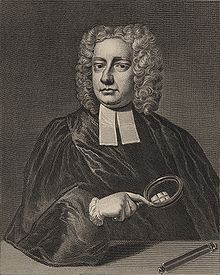John Theophilus Desaguliers
| John Desaguliers | |
|---|---|

John Theophilus Desaguliers (1683-1744)
|
|
| Born |
12 March 1683 La Rochelle, France |
| Died | 29 February 1744 (aged 60) Covent Garden, London, England |
| Residence | England |
| Nationality | French, English |
| Fields | Natural philosophy and engineering |
| Institutions | University of Oxford |
| Alma mater | Christ Church, Oxford |
| Academic advisors | John Keill |
| Notable students |
Stephen Demainbray Willem 's Gravesande Stephen Gray |
| Known for | Dissemination of Newtonian ideas, planetarium, ventilation, hydraulics, steam engines, Freemasonry |
| Influences | Isaac Newton |
| Notable awards |
Copley Medal (1734) Copley Medal (1736) Copley Medal (1741) |
John Theophilus Desaguliers (12 March 1683 – 29 February 1744) was a French-born British natural philosopher, clergyman, engineer and freemason who was elected to the Royal Society in 1714 as experimental assistant to Isaac Newton. He had studied at Oxford and later popularized Newtonian theories and their practical applications in public lectures. Desaguliers’s most important patron was James Brydges, 1st Duke of Chandos. As a Freemason, Desaguliers was instrumental in the success of the first Grand Lodge in London in the early 1720s and served as its third Grand Master.
Desaguliers was born in La Rochelle, several months after his father Jean Desaguliers, a Protestant minister, had been exiled as a Huguenot by the French government. Jean Desaguliers was ordained as an Anglican by Bishop Henry Compton of London, and sent to Guernsey. Meanwhile, the baby was baptised Jean Théophile Desaguliers in the Protestant Temple in La Rochelle, and he and his mother then escaped to join Jean in Guernsey.
In 1694 the family moved to London where Jean Desaguliers later set up a French school in Islington. He died in 1699. His son, who now used the anglicised name John Theophilus, attended Bishop Vesey's Grammar School in Sutton Coldfield until 1705 when he entered Christ Church, Oxford and followed the usual classical curriculum and graduated BA in 1709. He also attended lectures by John Keill, who used innovative demonstrations to illustrate difficult concepts of Newtonian natural philosophy. When Keill left Oxford in 1709 Desaguliers continued giving the lectures at Hart Hall, the forerunner of Hertford College, Oxford. He obtained a master's degree there in 1712. In 1719 Oxford granted him the honorary degree of Doctor in Civil Laws, after which he was often referred to as Dr Desaguliers. His doctorate was incorporated by Cambridge University in 1726.
Desaguliers was ordained as a deacon in 1710, at Fulham Palace, and as a priest in 1717, at Ely Palace in London.
...
Wikipedia
